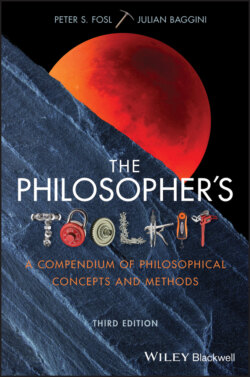Читать книгу The Philosopher's Toolkit - Julian Baggini, Julian Baggini - Страница 31
A deeper complexity
ОглавлениеAcknowledging the relative weakness of inductive inferences (compared to those of deduction), good reasoners qualify the conclusions reached through it by maintaining that they follow not with necessity but only with probability (i.e. it’s just highly probably that the sun will rise tomorrow). But does this fully resolve the problem? Can even this weaker, more qualified formulation be justified? Can we, for example, really justify the claim that, on the basis of uniform and extensive past observation, it is more probable than not that the sun will rise tomorrow?
The problem is that there is no deductive argument to ground even this qualified claim. To deduce this conclusion successfully we would need the premise ‘what has happened up until now is more likely to happen tomorrow’. But this premise is subject to just the same problem as the stronger claim that ‘what has happened up until now must happen tomorrow’. Like its stronger counterpart, the weaker premise bases its claim about the future only on what has happened up until now, and such a basis can be justified only if we already accept the uniformity (or at least probable continuity) of nature. But again, the uniformity (or continuity) of nature is just what’s in question.
